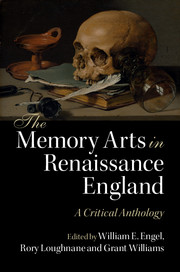Book contents
- Frontmatter
- Dedication
- Contents
- List of figures
- Acknowledgements
- A note on abbreviations
- Introduction
- PART I The art of memory
- PART II Rhetoric and poetics
- PART III Education and science
- PART IV History and philosophy
- PART V Religion and devotion
- PART VI Literature
- Introduction to Part VI
- POETRY
- PLAYS AND PROSE
- VI.11 Thomas Nashe, The Unfortunate Traveller (1594)
- VI.12 William Shakespeare, selected works
- VI.13 John Webster, selected works
- VI.14 Thomas Tomkis, Lingua: or the Combat of the Tongue (1607)
- VI.15 Mary Wroth, Urania (1621)
- VI.16 John Earle, Microcosmography (1628)
- VI.17 John Jones, Adrasta (1635)
- VI.18 Thomas Browne, Hydriotaphia, Urn-Burial (1658)
- VI.19 Anon., Crackfart and Tony; or, Knave and Fool (1680)
- VI.20 John Bunyan, The Pilgrim's Progress (1681)
- Index
- References
VI.12 - William Shakespeare, selected works
from PLAYS AND PROSE
Published online by Cambridge University Press: 05 August 2016
- Frontmatter
- Dedication
- Contents
- List of figures
- Acknowledgements
- A note on abbreviations
- Introduction
- PART I The art of memory
- PART II Rhetoric and poetics
- PART III Education and science
- PART IV History and philosophy
- PART V Religion and devotion
- PART VI Literature
- Introduction to Part VI
- POETRY
- PLAYS AND PROSE
- VI.11 Thomas Nashe, The Unfortunate Traveller (1594)
- VI.12 William Shakespeare, selected works
- VI.13 John Webster, selected works
- VI.14 Thomas Tomkis, Lingua: or the Combat of the Tongue (1607)
- VI.15 Mary Wroth, Urania (1621)
- VI.16 John Earle, Microcosmography (1628)
- VI.17 John Jones, Adrasta (1635)
- VI.18 Thomas Browne, Hydriotaphia, Urn-Burial (1658)
- VI.19 Anon., Crackfart and Tony; or, Knave and Fool (1680)
- VI.20 John Bunyan, The Pilgrim's Progress (1681)
- Index
- References
Summary
About the author
William Shakespeare (1564–1616) is one of the most influential writers of all time. Born and raised in Stratford-upon-Avon, he worked as a poet and as a dramatist and actor in the London theatres. He was a shareholder in the Lord Chamberlain's Men acting company (later the King's Men). Shakespeare retired from writing for the stage in 1613–14. In 1623, John Heminges and Henry Condell published the ‘First Folio’, a collection of thirty-six of Shakespeare's plays.
Shakespeare's writings on memory have attracted more critical attention than any other poet of the period, with Hamlet's plaintive question ‘Must I remember?’ (1.2.143) alerting readers to the crucial intellectual and religio-political concerns surrounding issues of memory and remembrance in Reformation England. Shakespeare never refers explicitly to the memory arts (unlike Webster, Jonson and others), but his works show a fascination with how memory functions, individually and socially. For example, in Love's Labour's Lost, Shakespeare repeatedly turns to the mechanics of memory: ‘Begot in the ventricle of memory, / nourished in the womb of pia mater’ (1.1.99–100), ‘Why that contempt will kill the speaker's heart, / And quite divorce his memory from his part’ (5.2.150–1) and ‘A fever she / reigns in my blood and will remember'd be’ (4.3.96–7). Similarly, in The Two Gentlemen of Verona, Shakespeare employs a familiar mnemonic image: ‘Lest, growing ruinous, the building fall, / And leave no memory of what it was’ (5.4.10–11). Such mention of ruins may evoke a wider cultural concern about the English Reformation's break from the Catholic Church, with abandoned monasteries in ruins a familiar sight in the English countryside. A curious episode in Titus Andronicus, where a Goth soldier ‘stray[s]’ from his troop to ‘gaze upon a ruinous monastery’ (5.1.21) once more alerts us to such topical concerns. A formal, deliberate approach to memorisation and remembrance is also often present in his works. Examples include: ‘Blotting your names from books of memory’ (1.1.96) in 2 Henry 6; ‘I would forget it fain; / But, O, it presses to my memory, / Like damned guilty deeds to sinners' minds’ (3.2.110–12) in Romeo and Juliet; ‘Except they meant to bathe in reeking wounds / Or memorise another Golgotha’ (1.2.39–40) in Macbeth; and ‘Yea, beg a hair of him for memory’ (3.2.131) in Julius Caesar.
- Type
- Chapter
- Information
- The Memory Arts in Renaissance EnglandA Critical Anthology, pp. 323 - 330Publisher: Cambridge University PressPrint publication year: 2016



